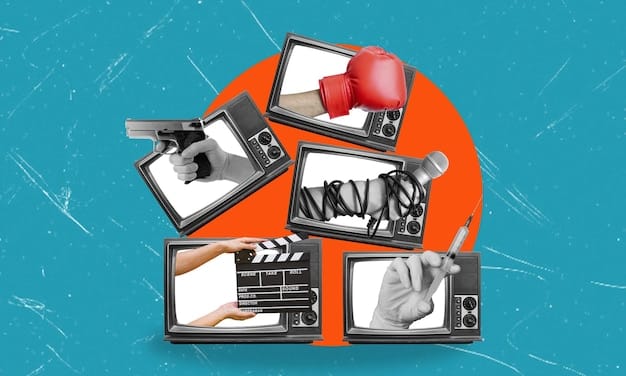How US Movie Critics Affect Box Office Success in Social Media Era

US movie critics significantly influence box office success in the age of social media by shaping audience perceptions, guiding viewing choices, and impacting a film’s initial reception through their reviews and online presence.
Have you ever wondered **how US movie critics are influencing box office success in the age of social media**? The power of a well-crafted review now extends far beyond traditional newspapers, shaping audience perception and potentially impacting a movie’s financial fate.
The Evolving Role of Movie Critics in the Digital Age
In today’s digital age, movie critics aren’t just writers; they’re influencers. Their opinions carry weight, amplified by social media and online platforms, shaping public perception and affecting the commercial success of films.
Their job has dramatically changed to keep up with technological advances. Let’s explore more specifically how the role of movie critics has evolved.
From Print to Pixels: The Media Landscape Transformation
The shift from traditional print media to digital platforms has broadened the reach of movie critics. What was once confined to newspapers and magazines now enjoys a global audience via websites, blogs, and social media.
Social Media Amplification: Critics as Influencers
Critics are now active participants in social media conversations; and the amplification of reviews on platforms like Twitter and YouTube has given them great influence with the general public. This has enabled them with the possibility of significantly affecting a movie’s reception.
In summary, The rise in online and social media has been a real game changer for film critics and is a large part of why this topic can be explored today. As viewers find new means of connecting with film, critics are there to help guide the way.

How Critics’ Reviews Shape Audience Perception
Movie reviews are more than just judgments; they’re powerful tools that shape audience expectations and influence viewing decisions. A positive review can generate buzz and excitement, while a negative one can deter potential moviegoers.
Now let’s analyze how film reviewers have changed the perceptions of film goers so intimately.
- The Power of First Impressions: Initial reviews often set the tone for a movie’s reception, influencing how audiences approach the film.
- Word-of-Mouth Amplification: Positive reviews generate buzz, fueling word-of-mouth marketing and boosting ticket sales.
- Countering Negative Perceptions: Strong reviews from respected critics can mitigate damage from negative buzz or trailers.
To build on that last thought, it’s important to remember that sometimes what looks like a bad movie, ends up being absolutely fantastic. In these cases, critics are most useful!
The Impact of Review Aggregators: Rotten Tomatoes and Metacritic
Websites such as Rotten Tomatoes and Metacritic, which collect reviews from multiple sources and assign scores, have become essential tools for moviegoers. These aggregators condense critical opinion into a single, easily digestible number, which can significantly impact a film’s box office performance.
The public generally trusts review aggregators, so let’s dive deeper into their impact!
The “Rotten” Effect: Negative Scores and Audience Aversion
A low score on Rotten Tomatoes can deter potential viewers, leading to lower ticket sales and diminished box office returns. The “rotten” label can be a major hurdle for a film to overcome.
The “Fresh” Advantage: Positive Scores and Box Office Boost
Conversely, a high score on Rotten Tomatoes can attract viewers, generating positive buzz and contributing to a successful box office run. The “fresh” label is a valuable asset for a movie.
It’s important to note that the Rotten Tomatoes and Metacritic are useful and easy to access. In the age of information, consumers have more power and direct access to opinions than they’ve had previously.
Social Media’s Influence on Critical Reception
Social media has revolutionized the way people consume and share information about movies. Platforms like Twitter, Facebook, and Instagram provide immediate and direct feedback, shaping a film’s critical reception in real time.
This feedback goes both ways, and reviewers are also influenced by social media trends. Let’s explore a deeper understanding with some of the following points.

Twitter’s Instantaneous Reactions: Shaping the Narrative
Twitter provides a forum for instant commentary and discussion about movies. The initial reactions and opinions expressed on Twitter can shape the narrative surrounding a film.
YouTube’s Long-Form Reviews: In-Depth Analysis and Critique
YouTube offers a platform for long-form movie reviews, allowing critics and enthusiasts to provide in-depth commentary and analysis. These videos can reach a wide audience and influence viewing decisions.
Keep in mind the overall narrative: The power of social media can be a great thing for filmgoers if one keeps an open mind and has a strong sense of self. It’s one thing to hear opinions, it’s another to rely upon them.
The Role of Influencers and Bloggers in Modern Movie Criticism
The traditional authority of professional movie critics is being challenged by the rise of social media influencers and bloggers. These individuals, often with large and dedicated followings, offer alternative perspectives and can sway audience opinion.
It’s arguable who carries more weight, but one thing is for certain: Influencers and bloggers are highly effective at getting their messages heard and seen. Consider these items.
- Authenticity and Relatability: Influencers and bloggers often connect with audiences on a more personal level, offering authentic and relatable perspectives.
- Niche Audiences and Targeted Reviews: They can cater to specific niche audiences, providing targeted reviews and recommendations.
- Sponsored Content and Ethical Concerns: There is potential for bias due to sponsored content and brand collaborations.
As you can see, all of this has created a complicated web of influence that did not previously exist. While many film critics provide ethical reviews, not all of today’s bloggers and influencers operate with the same goals.
The Ethics of Movie Criticism in the Age of Social Media
The lines between objective criticism, personal opinion, and sponsored content have blurred in the age of social media. This raises ethical concerns about transparency, honesty, and the potential for bias in movie reviews.
An educated film fan is one who does their research! Here are a few thoughts to consider.
Transparency and Disclosure: Revealing Potential Conflicts of Interest
Critics and influencers should disclose any potential conflicts of interest, such as sponsored content, brand collaborations, or personal relationships with filmmakers.
Objectivity vs. Subjectivity: Striking a Balance in Reviews
Reviews should strive for objectivity, providing balanced and well-reasoned arguments while acknowledging the inherent subjectivity of personal taste.
Combating Fake Reviews and Bots: Maintaining Credibility
Platforms and review aggregators should take measures to combat fake reviews and bots, ensuring that ratings and scores reflect legitimate audience opinions.
In conclusion, there is not necessarily a right answer. All of this depends on what an individual is looking for in a movie reviewer. Everyone has different tastes and preferences that can cause them appreciate one critic more than another.
Case Studies: Movies Whose Fate Was Shaped by Critics and Social Media
Examining specific movies whose box office performance was significantly affected by critical reception and social media buzz provides valuable insight into the power and influence of online opinions.
There are countless examples to explore. Consider the following and their impact.
“Lady Bird”: A Critical Darling’s Box Office Success
“Lady Bird” (2017) achieved widespread critical acclaim, earning a rare 99% “fresh” rating on Rotten Tomatoes. This positive reception translated into strong box office returns.
“Cats”: How Bad Reviews and Social Media Killed the Box Office
“Cats” (2019) was a film with a lot of talent, backing and hype. It ended as a critical failure and social media punchline, and ultimately bombed at the box office.
All in all, the critics have a large influence when looking at films of the past. However, there is also room for the opinions of the general public. And people have demonstrated an ability to form their own opinions when making determinations about what films they should or shouldn’t watch.
| Key Point | Brief Description |
|---|---|
| 🎬 Critical Influence | Critics shape perceptions and viewing choices significantly. |
| 📱 Social Amplification | Social media intensifies critics’ impact massively. |
| 📈 Aggregator Power | Sites like Rotten Tomatoes affect box office results. |
| 📣 Ethical Reviews | Reviews require transparency to maintain viewer trust. |
Frequently Asked Questions
▼
Critics’ reviews can substantially impact box office success, especially with the rise of online platforms and social media. Positive reviews can generate buzz and attract viewers, while negative reviews may deter potential moviegoers, directly affecting a film’s financial performance.
▼
Rotten Tomatoes and Metacritic are influential as they compile numerous reviews into a single, accessible score. This simplifies decision-making for viewers, making these aggregators vital. A good score can draw crowds, whereas a bad one might discourage them.
▼
Social media influencers provide alternative perspectives, often appealing to specific niche audiences. Their reviews can be highly effective due to their authenticity and relatability, impacting a film’s reception among their followers.
▼
Ensuring ethics involves transparency about potential conflicts of interest like sponsorships, striving for objectivity in reviews, and combating fake reviews. Upholding these practices helps maintain credible and trustworthy reviews.
▼
Yes, a movie can sometimes recover from bad reviews if it gains strong social media support. Positive word-of-mouth and audience engagement can counteract negative criticism, especially if the film resonates with viewers on a personal level.
Conclusion
In conclusion, the dynamic interaction between **US movie critics and social media profoundly impacts box office success**. By understanding the evolving role of critics, the influence of review aggregators, and the power of social media, filmmakers and audiences alike can navigate the complex world of modern movie consumption.





